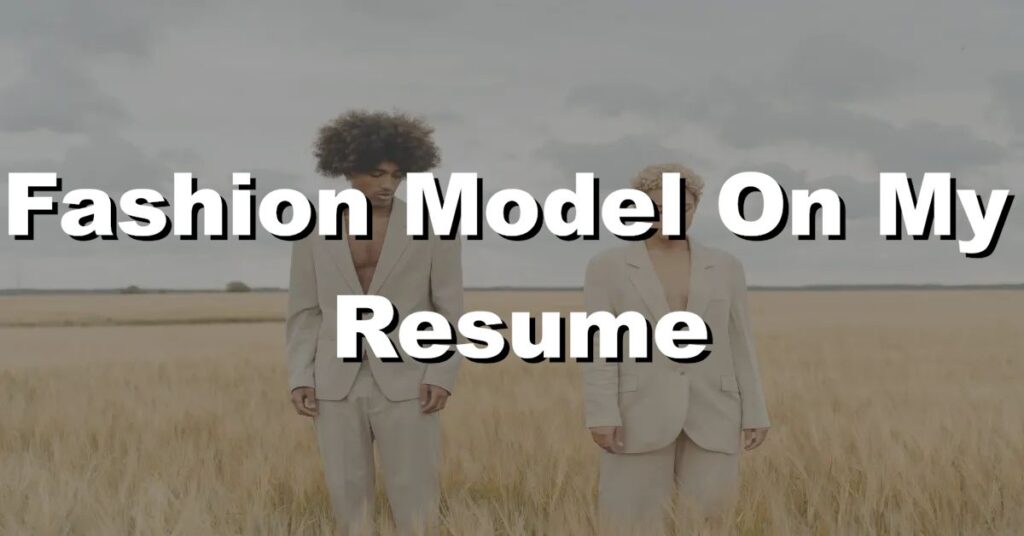Whether you’re an aspiring model or a seasoned professional, you may be wondering if it’s worth putting fashion model on your resume.
In this blog post, we will discuss the pros and cons of including this information, and whether or not it will help you land your dream job.
The Advantages and Disadvantages of Including Fashion Modeling on Your Resume
Including fashion modeling on your resume can have both advantages and disadvantages. On the positive side, it showcases your experience in a competitive industry and demonstrates qualities such as confidence, poise, and the ability to work under pressure.
Modeling can also highlight your visual presentation skills, attention to detail, and ability to adapt to different environments and requirements. It can be especially beneficial if you’re applying for jobs in industries where appearance, aesthetics, or customer-facing roles are important.
However, it’s important to consider the potential drawbacks as well. Some employers may view modeling as unrelated to their specific job requirements, and it could potentially overshadow other relevant experience or skills.
Additionally, if you include modeling on your resume, be prepared for potential questions or assumptions about your availability, flexibility, and long-term commitment to the role.
The Skills and Experiences Gained from Being a Fashion Model That Can Be Relevant to Other Industries
Being a fashion model can provide you with valuable skills and experiences that are transferable to other industries. Firstly, modeling often requires excellent communication skills, as you work with photographers, designers, and clients to bring their vision to life. This ability to effectively communicate and collaborate is highly sought after in various professional settings.
Additionally, modeling helps develop adaptability and the capacity to work under pressure and in fast-paced environments, which can be applicable in many industries. Furthermore, the experience of presenting oneself professionally and maintaining a polished appearance can be advantageous in customer-facing roles or positions that require a strong personal brand.
Lastly, modeling frequently involves teamwork and the ability to take direction, skills that are valuable in collaborative work environments.
The Importance of Tailoring Your Resume to The Job You Are Applying For
Tailoring your resume to the job you are applying for is crucial in showcasing your suitability and maximizing your chances of securing an interview. By customizing your resume, you can highlight the most relevant skills, experiences, and achievements that align with the specific job requirements.
Start by carefully reviewing the job description and identifying keywords, qualifications, and specific tasks or responsibilities that the employer is seeking. Then, modify your resume to emphasize your related experiences and skills, ensuring that they are clearly and concisely presented.
This tailored approach demonstrates your attention to detail and shows the employer that you have taken the time to understand their needs and position. Remember to review and update your resume for each application, as different roles may require different emphases or examples of your capabilities.
How To Highlight Your Modeling Experience in A Way That Is Relevant to The Job
When highlighting your modeling experience on your resume, it’s important to frame it in a way that is relevant to the job you’re applying for. Start by focusing on the transferable skills and experiences gained through modeling that align with the position.
For example, highlight your ability to work collaboratively with diverse teams, manage time effectively, or maintain professionalism in high-pressure situations. Emphasize any customer service or client relations experience that you acquired through modeling, as these skills are valuable in various industries.
Additionally, if you have gained expertise in specific areas such as styling, fashion coordination, or event planning during your modeling career, be sure to showcase those relevant skills. Finally, quantify your accomplishments whenever possible, such as the number of successful campaigns or events you participated in, to demonstrate your impact and results.
The Role of Modeling in Developing Professional Skills: Communication, Teamwork, And Adaptability
Modeling plays a significant role in developing essential professional skills such as communication, teamwork, and adaptability. Effective communication is crucial in the modeling industry, as you need to clearly understand and execute the vision of photographers, designers, and clients.
This skill translates well into other industries where collaboration, customer interactions, and conveying ideas are essential. Modeling also fosters teamwork, as you often work with other models, hair and makeup artists, stylists, and production teams to achieve a common goal.
This experience of collaborating with diverse individuals and managing interpersonal dynamics is valuable in team-based work environments.
Furthermore, modeling requires adaptability, as you may encounter different environments, locations, and creative concepts that require flexibility and the ability to quickly adapt to change. This adaptability is highly transferable to various professional settings where agility and resilience are valued.
Conclusion
In conclusion, if you have experience as a fashion model and are applying for a job in the fashion industry, it may be relevant to include on your resume.
However, if you’re applying for a job in a different industry, it may not be necessary to include your experience as a fashion model.

